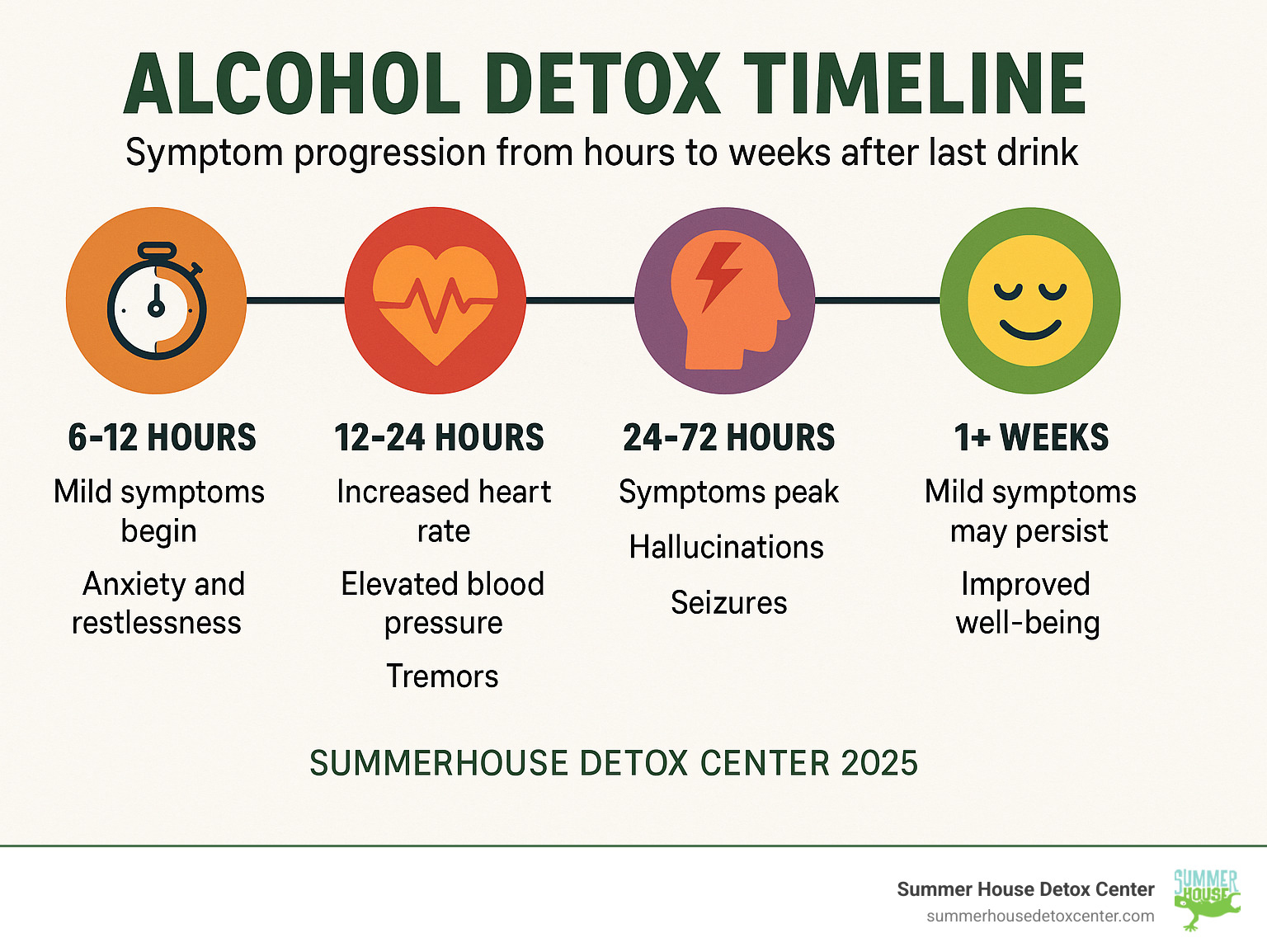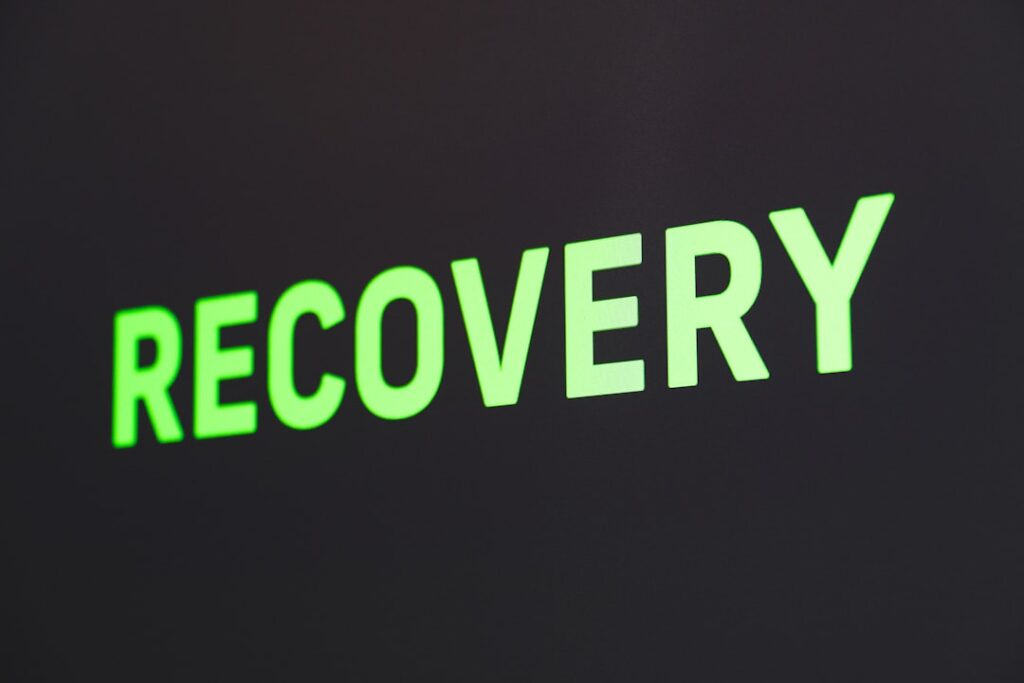Why Alcohol Detox and Recovery Requires Professional Support
Alcohol withdrawal is a genuine medical condition, and getting through it safely almost always demands professional help. At our Miami, Florida facility, Summer House Detox Center offers round-the-clock, physician-led care so you can begin recovery with confidence.
Quick facts to know
- Symptoms start 6–24 h after the last drink and peak within 24–72 h.
- Most physical discomfort resolves in 7–10 days; mood-related issues can linger.
- Severe withdrawal (seizures, Delirium Tremens) can be fatal without treatment.
- Medically supervised detox greatly improves long-term sobriety rates.
- Detox is the first step; ongoing therapy and support keep you alcohol-free.
Each history with alcohol is different, so your detox plan has to be individual, too. Medical monitoring, safe medication, and a supportive environment help prevent complications and make the process far more comfortable than any DIY attempt.
Need proof? Multiple studies show that people who detox under medical care are more likely to complete treatment and remain sober one year later. Your health—and your life—are worth that extra protection.
Understanding Alcohol Detox and Withdrawal

Regular drinking forces the brain to balance alcohol’s sedating effect by releasing extra stimulating chemicals. Over time, this creates physical dependence: you need alcohol simply to feel normal. When you suddenly stop, those stimulants surge unchecked and produce withdrawal.
What’s the difference between alcohol abuse, dependence, and addiction?
What is Alcohol Detoxification?
Detox is the medically managed process of clearing alcohol from your body while keeping you safe and stable. It involves
- Evaluation of medical history and current health.
- Stabilization with medication, fluids, and nutrition.
- Planning the next phase of treatment.
Detox itself is not a cure—it simply prepares your brain and body for real recovery work. The science of detox explains why.
What is Alcohol Withdrawal Syndrome (AWS)?
AWS is the collection of physical and psychological symptoms that appear when a dependent drinker stops or cuts back. Severity depends on drinking patterns, overall health, and prior withdrawals (the “kindling” effect). Learn more about how your body reacts to alcohol withdrawal. Recognizing these signs early lets you seek professional help before complications develop.
The Dangers and Symptoms of Alcohol Withdrawal

Unlike many other drugs, quitting alcohol can be life-threatening. Delirium Tremens (DTs) develops in roughly 5 % of withdrawal cases and, without treatment, can be fatal in up to 15 %. Seizures, dangerous spikes in blood pressure, and severe dehydration are additional risks—all reasons detox should be done under medical care. Can you die from alcohol abuse?
Common Withdrawal Symptoms (survey of 2,000 people)
- Anxiety 49 %
- Irritability 47 %
- Sweating 45 %
- Fatigue 42 %
- Hand tremors 34 %
- Nausea 24 %
- Mood swings 24 %
- Rapid heart rate 23 %
- Hallucinations 13 %
- DTs 11 %
- Seizures 8 %
Managing stress and anxiety during detox
Alcohol Detox Timeline (typical)

- 6–12 h: mild anxiety, headache, nausea.
- 12–48 h: tremors, rising anxiety; seizures possible.
- 48–72 h: peak danger period; DTs may appear.
- 4–10 days: physical symptoms taper.
- Weeks–months: some experience Post-Acute Withdrawal Syndrome (PAWS).
For full details, see the alcohol detox timeline and the first 72 hours of detox.
Why Medical Supervision is Critical for Safe Alcohol Detox and Recovery

Going “cold turkey” at home can feel private, but it leaves you vulnerable to seizures, DTs, and relapse. At Summer House Detox Center we use the CIWA scale to track symptoms, adjust medications, and keep you comfortable 24/7. Continuous monitoring of vitals and quick access to emergency care make a life-saving difference. The importance of medically supervised detox
Why DIY Detox Is Risky
- No one on hand to treat seizures or heart complications.
- Ease of relapse when cravings peak.
- Kindling effect makes each unsupervised attempt more dangerous.
Advantages of a Professional Detox Program
- Individualized medication plans.
- Nutritional and hydration support.
- A trigger-free environment that supports sobriety.
- Seamless hand-off to rehab services so progress isn’t lost.
Breaking the cycle starts with a safe, medically managed detox.
The Path Forward: Treatment and Support After Detox

Finishing detox is a milestone, not a finish line. Your brain chemistry still needs time to heal, and new coping skills must be learned. Transitioning straight from detox into therapy or rehab dramatically improves success rates. From detox to recovery: the next steps
Medications That Help
| Phase | Goal | Examples |
|---|---|---|
| Acute withdrawal | Prevent seizures, stabilize vitals | Benzodiazepines, anticonvulsants, beta-blockers |
| Early recovery | Lower cravings | Naltrexone, Acamprosate |
| Relapse prevention | Deterrent | Disulfiram |
Thiamine, folic acid, and other vitamins repair nutritional deficits. Details: what type of medications are used in alcohol treatment.
Therapy & Support Systems
- Inpatient or residential rehab
- Partial hospitalization (day programs)
- Intensive or standard outpatient care
- Evidence-based counseling (CBT, motivational therapies)
- Peer groups such as AA, SMART Recovery, LifeRing
Find out what treatments are available in alcohol rehab and why connecting with others sustains long-term sobriety.
Frequently Asked Questions about Alcohol Detox
How long does alcohol detox take?
One of the most common questions people ask when considering alcohol detox and recovery is about timing. While every person’s journey is unique, research gives us some helpful guidelines about what to expect.
The typical detox timeline spans 3-10 days for most people, though this can vary significantly based on your individual circumstances. Physical symptoms usually resolve within the first week to ten days, but psychological symptoms can linger much longer – sometimes for weeks or months.
Think of it this way: your body has been adjusting to alcohol for however long you’ve been drinking heavily. It needs time to readjust to functioning without it. A recent survey of over 2,000 people who completed alcohol detox found that symptoms lasted an average of 4.83 days, with 95% of people experiencing symptoms for 2-8 days.
Several factors influence how long your detox will take. Heavy drinkers typically experience longer, more intense withdrawal periods. Your age and overall health also play important roles – younger, healthier people often recover more quickly. If you’ve been through withdrawal before, subsequent episodes tend to be more severe due to something called the “kindling effect.”
Co-occurring medical or mental health conditions can extend your detox timeline, as can the use of other substances alongside alcohol. This is why our medical team conducts a thorough evaluation before your detox begins – we want to give you the most accurate expectations possible.
For more detailed information about alcohol detox: how long does it take, our experienced staff can provide a personalized timeline based on your specific situation during your initial assessment.
Can you die from alcohol withdrawal?
This is perhaps the most serious question about alcohol withdrawal, and the honest answer is yes – alcohol withdrawal can be fatal. This reality is exactly why we emphasize the importance of medical supervision so strongly.
Delirium Tremens (DTs) represents the most dangerous complication of alcohol withdrawal. It occurs in 5-10% of people going through withdrawal and can be fatal in 5-15% of cases if left untreated. DTs typically develop 48-72 hours after your last drink and involve severe confusion, high fever, and dangerous changes in heart rate and blood pressure.
Seizures present another serious risk, usually occurring within the first 48 hours of withdrawal. They can happen without warning and may lead to serious injury or death. The risk peaks around 24 hours after your last drink, which is why those first few days require such careful monitoring.
Cardiac complications can also be life-threatening, especially for people with existing heart conditions. Withdrawal can cause dangerous changes in heart rate and blood pressure that may lead to heart attack or stroke. Other serious complications include severe dehydration, electrolyte imbalances, and dangerously high body temperature.
Here’s the reassuring truth: with proper medical supervision, these risks are dramatically reduced. At Summer House Detox Center, our medical team has the expertise and equipment to prevent these complications and treat them immediately if they occur. We monitor your vital signs continuously and can intervene at the first sign of trouble.
The fatality rate for medically supervised detox is extremely low compared to unsupervised withdrawal. This is why we never recommend trying to detox alone – it’s simply not worth the risk when safe, comfortable alternatives are available.
What happens after alcohol detox is complete?
Completing detox is a huge accomplishment – you should feel proud of taking this crucial first step. But it’s important to understand that detox is really just the beginning of your recovery journey, not the end.
The immediate next steps involve transitioning to ongoing treatment. Our team begins planning for this transition from the moment you arrive, ensuring there’s no gap in your care. We’ll assess what level of ongoing treatment is most appropriate for your situation and help you make a smooth transition.
Treatment options vary based on your needs and circumstances. Residential treatment provides 24/7 support in a structured environment, which many people find helpful after detox. Partial hospitalization programs offer intensive daytime treatment while allowing you to return home in the evenings. Intensive outpatient programs provide flexibility for people who need to maintain work or family responsibilities, while standard outpatient therapy offers regular counseling sessions with maximum flexibility.
The key components of ongoing treatment include individual and group counseling, education about addiction and recovery, development of coping skills, and relapse prevention planning. Many people also benefit from family involvement and peer support groups.
Long-term recovery support extends far beyond formal treatment. This might include ongoing therapy, medication management if needed, support group participation, alumni programs, and the development of healthy lifestyle habits. The goal is to build a comprehensive support system that sustains your recovery over time.
For more information about what happens after alcohol detox, our team can help you understand your options and create a personalized plan for continued recovery.
Recovery is a process, not an event. Each step builds on the previous one, and with the right support and commitment, lasting recovery is absolutely possible. You’ve already taken the hardest step by completing detox – now it’s time to build on that foundation.
Conclusion: Taking the First Step Towards a New Beginning
Alcohol detox and recovery is more than just a medical process – it’s the beginning of reclaiming your life. If you’re reading this right now, you’ve already taken the most important step: you’re seeking help and information. That takes real courage, and you should be proud of yourself for getting this far.
Let’s be honest – the thought of detox can feel overwhelming. You might be scared, uncertain, or even skeptical about whether recovery is possible for you. These feelings are completely normal, and you’re not alone in having them.
Here’s what we want you to remember: detox is just the beginning, not the end. It’s like clearing the fog from your windshield so you can see the road ahead clearly. Yes, it’s essential – but it’s also just the first step toward the life you deserve.
Professional supervision isn’t just recommended – it’s critical. The risks of trying to detox alone are simply too great. We’ve seen too many people struggle needlessly or put themselves in danger by attempting to go “cold turkey” at home. You don’t have to be a hero here. Let us help you do this safely.
Every person who walks through our doors has a unique story, and that’s exactly how we treat you. Your recovery journey is yours alone, and your detox plan should reflect your specific needs, health history, and goals. There’s no one-size-fits-all approach to recovery.
At Summer House Detox Center in Miami, we understand that asking for help takes tremendous courage. Maybe you’ve tried to quit before. Maybe you’re worried about judgment or shame. Maybe you’re scared of what life will look like without alcohol.
We get it. Our team includes people who have walked this path themselves. We know the fear, the uncertainty, and the hope that comes with deciding to change your life. We’re here to meet you exactly where you are – with compassion, expertise, and unwavering support.
Recovery is absolutely possible. We see it happen every day. People who thought they’d never be free from alcohol go on to rebuild their relationships, pursue their dreams, and find who they really are when they’re not fighting addiction.
But here’s the thing – you don’t have to figure this out alone. Professional help and peer support don’t just make the journey safer; they make it more successful. Why struggle in isolation when you can have a whole team of people rooting for you?
We believe that every person deserves to be treated with dignity and respect during this vulnerable time. Our approach focuses not just on keeping you medically safe, but on creating a comfortable, supportive environment where you can focus entirely on healing and preparing for what comes next.
Your new beginning starts with a simple phone call. We’re here to answer your questions, verify your insurance, and help you understand your options. There’s no pressure, no judgment – just caring professionals who want to help you take the first step toward the life you deserve.
Remember: seeking help isn’t giving up – it’s taking control. It takes strength to admit you need help, and even more strength to actually reach out and get it. You’ve already shown that courage by considering professional alcohol detox and recovery services.
Don’t wait for the “perfect” moment to start your recovery journey. The best time to begin is right now, today. Contact us to learn more about our alcohol detox services and take that first brave step toward a healthier, happier future.
Your recovery story is waiting to be written. Let us help you write the first chapter.
